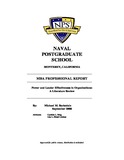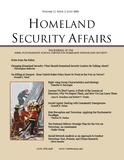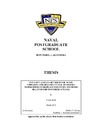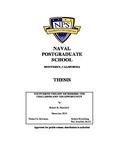Power and leader effectiveness in organizations: a literature review

Download
Author
Barksdale, Michael M.
Date
2008-09Advisor
King, Cynthia L.
Lindsey, Lisa L. Massi
Metadata
Show full item recordAbstract
This study examines the effects of power, interpersonal attraction, and perceived similarity on employee and organizational outcomes. The purpose of this paper is twofold: The first purpose is to review the communication and organizational literature on power in order to illustrate how various uses and forms of power impact employee perceptions of leaders. Scholars from various disciplines have accepted the definition of power as "the capacity to produce intended effects, and in particular, the ability to influence the behavior of another person" (Burgoon and Dunbar, 2005, p. 208). This definition of power can be extended to describe a leader's power in the workplace, as leaders are often characterized by their capacity to make effective decisions and their ability to influence their employees' actions and perceptions. The results of this research on power might aid military leaders in better understanding how their communicative behaviors impact their subordinates. The second purpose of this paper is to review the literature on interpersonal attraction and investigate its impact on employee outcomes. Interpersonal attraction in a relationship is most often described as the attitude(s) that one person has toward another person. The nature of interpersonal attraction in relationships has been associated with individual mental health and physical well-being (Orbuch and Sprecher, 2003), and perceived similarity is a factor that often explains why interpersonal attraction occurs in the workplace (Morry, 2007). The results of this research on interpersonal attraction and perceived similarity might aid military leaders in further understanding how interpersonal attraction in relationships might impact organizational outcomes.
Description
MBA Professional Report
Related items
Showing items related by title, author, creator and subject.
-
Homeland Security Affairs Journal, Volume II - 2006: Issue 2, July
Naval Postgraduate School Center for Homeland Defense and Security (CHDS) (Monterey, California. Naval Postgraduate SchoolCenter for Homeland Defense and Security, 2006-07);July 2006. The July 2006 issue of Homeland Security Affairs offers articles about risk perception, domestic right wing extremist groups, social network analysis, and the impact of foreign policy on homeland security. It ... -
YOU CAN’T ALWAYS GET WHAT YOU WANT: EMPLOYEE AND ORGANIZATIONAL RESPONSES TO PERCEIVED WORKPLACE INJUSTICES AND THEIR RELATIONSHIP TO INSIDER ATTACKS
Reed, Tracey (Monterey, CA; Naval Postgraduate School, 2019-03);Insider threats are a wicked problem. This thesis investigates three questions: how do employees respond to perceived workplace injustice, what is the relationship between employee responses to perceived workplace injustices ... -
Countering violent extremism the challenge and the opportunity
Deardorff, Robert B. (Monterey, California. Naval Postgraduate School, 2010-12);It is crucial for the United States to confront the increasing incidence of Americans who turn to violence against their fellow citizens in support of Islamist terrorists. This thesis explores the application of "soft ...


 08Sep_Barksdale_MBA.pdf (221.4Kb)
08Sep_Barksdale_MBA.pdf (221.4Kb)

